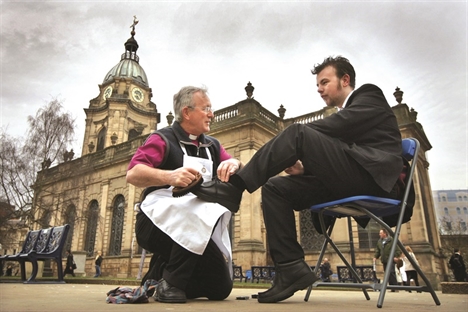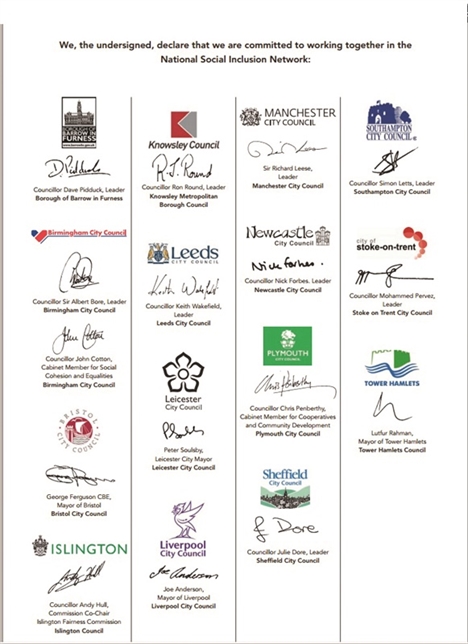15.04.14
Tackling social inequality nationally
Source: Public Sector Executive April/May 2014
Cllr John Cotton, Birmingham City Council’s cabinet member for social cohesion and equalities, talks about the development of the National Social Inclusion Network and what it will mean for tackling inequality in the UK.
An alliance of cities, towns and boroughs has been formed as part of the new National Social Inclusion Network, aimed at tackling social inequality in England.
It follows two years of work in Birmingham on the Social Inclusion Process, the success of which prompted the national initiative, set up by the leader of Birmingham City Council and the Bishop of Birmingham, Rt Revd David Urquhart (pictured below).

All 15 councils participating in the network so far have signed the Birmingham Declaration on Social Inclusion, which could be for local action on equality what the Nottingham Declaration was for local action on climate change from 2000-2013.
Cllr John Cotton, Birmingham City Council’s cabinet member for social cohesion and equalities, told PSE: “The declaration is recognition, on the part of major towns and cities, like Birmingham, that we know we have real issues around inequality and deprivation to tackle.
“If I look at the pattern of disadvantage in my own city of Birmingham, we know that while interventions have stopped decline and things getting worse, they haven’t delivered the fundamental changes we need to see for people living in those communities – in terms of employment, health outcomes, educational attainment and levels of child poverty.
“That was a tough hill to climb already, but budget cuts and some of the welfare changes are making the hill even steeper. So, the fact we want to work together and share know-how, and to campaign on some common issues – such as more powers and flexibility over existing budgets – is quite a powerful statement.”
The declaration states that, against a backdrop of public sector cuts, the task of creating more inclusive cities has moved beyond what local or national government can do alone.
Cllr Cotton said: “Prior to the declaration, the social inclusion process has been a really fundamental root and branch look at some of the causes of inequality in Birmingham, but also very action-focused. It has been about the practical approaches we can take to deal with these issues.”
Examples of the work already include the Birmingham Youth Jobs Fund, set up to target the city’s 3,000 18-24 year olds unemployed for 12 months or more, to give them access to subsidised job opportunities. There was also the multi-agency committee on welfare reform. It attracted Lottery funding to set up the ‘Gateway to Birmingham Advice Services’ project, developed the city’s policy on Discretionary Housing Payments (with over 9,000 payments made to date) and re-established the Financial Inclusion Partnership, which is developing the city’s response to illegal loan sharks and the Fair Money Manifesto.
The National Social Inclusion Network councils will share learning and develop joint campaigns on social inclusion, build a strong collective voice, and identify action that can be taken around issues of shared concern. The co-signatories say fairer, more equal societies improve people’s overall wellbeing and outcomes, enabling residents to participate fully in civic and economic life. This helps communities and families become more resilient and better able to shape their own futures.
Too many people are excluded from mainstream society, they say, with large gaps in wealth, income, health and wellbeing.
Mayor of Liverpool Joe Anderson said: “These are tough times for people, with cuts to essential services and reductions in welfare all contributing to increasing social inequality. The National Social Inclusion Network will provide an opportunity to bring together our experience and expertise, learn from each other and combine our efforts to build a strong collective voice to articulate the arguments for social inclusion for all our communities across the country.”
The formation of the Network and the Birmingham Declaration came out of the National Social Inclusion Symposium hosted by Urquhart and Birmingham’s council leader, Cllr Sir Albert Bore, funded by the Barrow Cadbury Trust, in September 2013.
Cllr Cotton said: “I do believe we can all work together. It isn’t about reinventing the wheel in all these different boroughs. We know we have common concerns and challenges and therefore we will have common initiatives to meet those.”
The network’s activities will be focused on eight themes identified from the reports produced by fairness and poverty commissions from around the country and developed at the symposium, each with its own council champion. They are:
• Living wage and income inequality (Islington)
• Impact of welfare reform (Birmingham)
• Fuel, finance and food (Plymouth)
• Education and skills (Liverpool)
• Youth employment (Birmingham)
• Transport, access and affordability (Sheffield)
• Democratic accountability (Newcastle)
• Housing (Tower Hamlets)
Cllr Andy Hull, Islington Council’s executive member for finance and performance,
said: “Islington established the country’s first Fairness Commission in 2010 to tackle poverty and reduce inequality in our part of London.
“There are now at least 12 other Fairness Commissions across the UK, all working at a local level to bridge the gaps that can divide our unequal society. The new National Social Inclusion Network brings together those Fairness Commissions and other local authorities committed to tackling social exclusion, teaming up to tackle shared problems and develop a national Fairness agenda.”
Cllr Cotton said: “As with our social inclusion process in Birmingham, we want this to be really action-focused – so it isn’t just a repeat of self-evident truths. It is about taking practical steps and taking some challenge back to government.
“If you look at welfare, if we had more influence and control over these big DWP budgets – rather than having things imposed top-down – we could design things locally. We have the expertise, know-how and connections to make it work much more effectively for the people who live in our towns and cities.”
Urquhart said the Network will provide an opportunity to bring together experience and expertise to build a strong collective voice to articulate the arguments for social inclusion for all communities across the country.
Cllr Cotton added: “We have all been working on these agendas for some time. But the state of the crisis we now face in local government means we have to find new ways of working and co-ordinating activity.
“We are looking at really severe budget cuts being imposed, so we know we have to use other networks while working with others far more closely and sharing resources and know-how. From this, I’d like to see a fairer deal for local authorities. I’d like to see more local control over budgets that directly affect life chances for people living in cities.
"I’d like to see a closing of the gap between the least advantaged neighbourhoods and those that are more fortunate. That will be the real test to see if we have achieved our objectives.”
The signatories
Barrow-in-Furness
Birmingham
Bristol
Islington
Knowsley
Leeds
Leicester
Liverpool
Manchester
Newcastle
Plymouth
Sheffield
Southampton
Stoke-on-Trent
Tower Hamlets
Birmingham Declaration – March 2014
We recognise that social inclusion is essential to the future success of this country and all its citizens, businesses and communities. All residents have a right to have access to the opportunities that a modern society brings.
More equal and fairer societies result in better wellbeing and improved outcomes for people and communities, enabling residents to participate fully in civic and economic life. By achieving better outcomes, people, families and communities become more resilient and are able to shape their own futures.
However too many residents across the country are still excluded from mainstream society. There are significant social and material inequalities in all our towns and cities, with large gaps in wealth, income, health and wellbeing. This is not acceptable.
The social inclusion challenge has been made more difficult against a backdrop of public sector budget cuts and the global economic crisis which has meant that statutory organisations no longer have the resources to tackle these issues in the same way that has been done previously. The task of creating more inclusive cities has moved beyond what local or national government can do on their own.
The current economic climate necessitates an urgent need to rally resources and expertise around targeted action that will mitigate further inequality and exclusion.
We have therefore agreed to work together. We will continue to pool our collective knowledge and understanding, developed through our various social inclusion, poverty and fairness commissions, to share thinking around issues of deep concern and to learn from each other about what we can do to bring greater inclusion.
It will require our combined energy, resources and wisdom to address the fundamental economic and social issues that we face and to protect the most vulnerable in our communities.
This declaration is a symbol of our collective commitment to articulate the arguments for social inclusion for all of our communities across the country.
The towns and cities signed up to this declaration agree to:
• Participate in a national social inclusion network
• Share learning and develop joint campaigning on key issues around social inclusion
• Build a strong collective voice to articulate the arguments for social inclusion for all our communities across the country
• Identify action that can be taken around issues of shared concern
